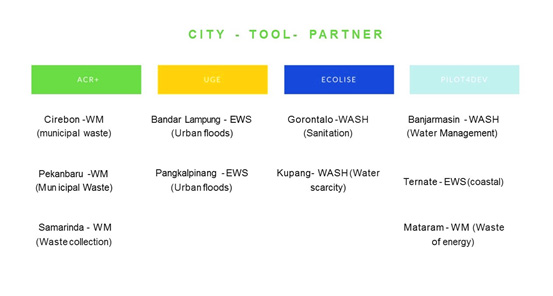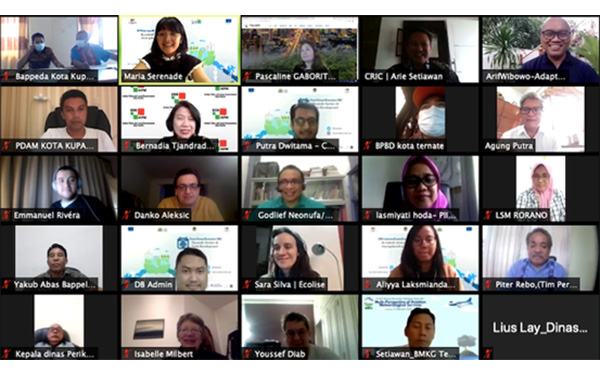February 2021 | Jakarta – UCLG ASPAC and the European Union (EU) collaborative programme on Climate Resilient and Inclusive Cities (CRIC) ensured cities’ needs for inclusive and climate resilient goal achieved by linking them with the right partners. It was conducted through a five-day Focus Group Discussion (FGD) in thematic sectors from 1 to 4 February and 11 February 2021. The FGD was held as a follow-up action after the Urban Analysis Report (UAR) publication in 2020. The report altogether with the result of FGD provides basis for tool development to help pilot cities to solve their climate challenges in three priority sectors: waste management, water and sanitation, and early warning system (EWS).
The Focus Group Discussion
Moderated by CRIC Project Coordinator Putra Dwitama, the FGD invited: City Working Group of ten pilot cities; European and South Indian partners from Pilot4Dev, ACR+, Gustave Eiffel University, Ecolise and All India Institute of Local Self-Government (AIILSG); and reviewers from the Ministry of Environment and Forestry (MoEF) – Directorate for Climate Change’s Deputy Director for Vulnerability Identification and Assessment Mr. Arif Wibowo and Deputy Director for Adaptation Planning Mr. Anak Agung Gede Putra.
 Mr. Arif Wibowo from MoEF’s applauded the FGD as important progress for the CRIC programme. On this occasion, he also called for cities to “go beyond business-as-usual by mainstreaming resilience into relevant development planning document.”
Mr. Arif Wibowo from MoEF’s applauded the FGD as important progress for the CRIC programme. On this occasion, he also called for cities to “go beyond business-as-usual by mainstreaming resilience into relevant development planning document.”
The FGD linked the ten pilot cities of CRIC programme with partners. Cities shared climate related challenges they faced and partners showcased how their tools could help cities tackling the challenge. Most importantly, the FGD also allowed cities and partners to customise the tools to further meet specific cities’ needs.
 Bandar Lampung, for example, is a city prone to recurrent floods with 51 floods-prone areas. The city has passed on several measures to tackle urban floods, such as through Disaster Resilient Village and Climate Village programmes. Bandar Lampung has also explored collaboration with a local university to develop a water level sensor, yet the implementation is now on hold.
Bandar Lampung, for example, is a city prone to recurrent floods with 51 floods-prone areas. The city has passed on several measures to tackle urban floods, such as through Disaster Resilient Village and Climate Village programmes. Bandar Lampung has also explored collaboration with a local university to develop a water level sensor, yet the implementation is now on hold.
“Bandar Lampung needs an integrated urban flood early warning system,” said Dr. Khaidarmansyah, Head of Bandar Lampung Development Planning Agency. “The tools should encompass risks map, hazard monitoring system, warning service, communication, capacity building for local communities and EWS Standard Operating Procedures document.”
Early warning system tool will be developed by CRIC under the supervision of Gustave Eiffel University’s Professor Youssef Diab. Addressing the need of Bandar Lampung, Professor Youssef said that in developing EWS, it is important to recognise geographically specific hazard to determine the EWS tool to be developed and to ensure that the tool is targeted to those who are at risk. He further stated that it is important to increase urban resilience in a holistic way. On a similar note, Mr. Agung Putra from the MoEF underlined that a more integrated approach to tackle urban floods will require cities to improve its governance, infrastructure and increase stakeholder engagement.
The case of Bandar Lampung also suggests that the approach to address climate change needs to move beyond administrative borders by strengthening regional cooperation with neighbouring cities/regencies.
UAR, FGD Result and Tool Development
Based on the UAR and FGD result, the CRIC Programme managed to link and match cities’ needs with partners’ capacities as shown below.

Following this FGD, CRIC will hold a subsequent discussion to present a more detailed tool development proposal from all European partners. The tool development process is taking place throughout 2021.
From Local Action to National Goals
 Opening and closing the event, UCLG ASPAC’s Secretary General Dr. Bernadia Irawati Tjandradewi reiterated the importance of political commitment in tackling climate change. “We need more than technological solutions to solve the problems in the cities, such as waste management, floods and sanitation. First and foremost, local leaders have to turn their political commitment into action,” she said.
Opening and closing the event, UCLG ASPAC’s Secretary General Dr. Bernadia Irawati Tjandradewi reiterated the importance of political commitment in tackling climate change. “We need more than technological solutions to solve the problems in the cities, such as waste management, floods and sanitation. First and foremost, local leaders have to turn their political commitment into action,” she said.
 In addition, the Secretary to Directorate General of Climate Change, Novia Widyaningtyas said in her opening remarks that the tools adoption will complement the climate change mitigation and adaptation actions at a city level. Local actions will contribute to the Indonesia’s Nationally Determined Contribution (NDC) target to reduce GHG emissions by 29 percent against BAU scenario, or up to 40 percent with international support by 2030. In line with the NDC target, Ms. Novia said that Indonesia sets to develop 20,000 Climate Villages (Program Kampung Iklim/Proklim) by 2024 as stated by President Joko Widodo during the Climate Adaptation Summit 2021. Cities need to align their local action plans with Proklim agenda to further accelerate the NDC achievement.
In addition, the Secretary to Directorate General of Climate Change, Novia Widyaningtyas said in her opening remarks that the tools adoption will complement the climate change mitigation and adaptation actions at a city level. Local actions will contribute to the Indonesia’s Nationally Determined Contribution (NDC) target to reduce GHG emissions by 29 percent against BAU scenario, or up to 40 percent with international support by 2030. In line with the NDC target, Ms. Novia said that Indonesia sets to develop 20,000 Climate Villages (Program Kampung Iklim/Proklim) by 2024 as stated by President Joko Widodo during the Climate Adaptation Summit 2021. Cities need to align their local action plans with Proklim agenda to further accelerate the NDC achievement.











